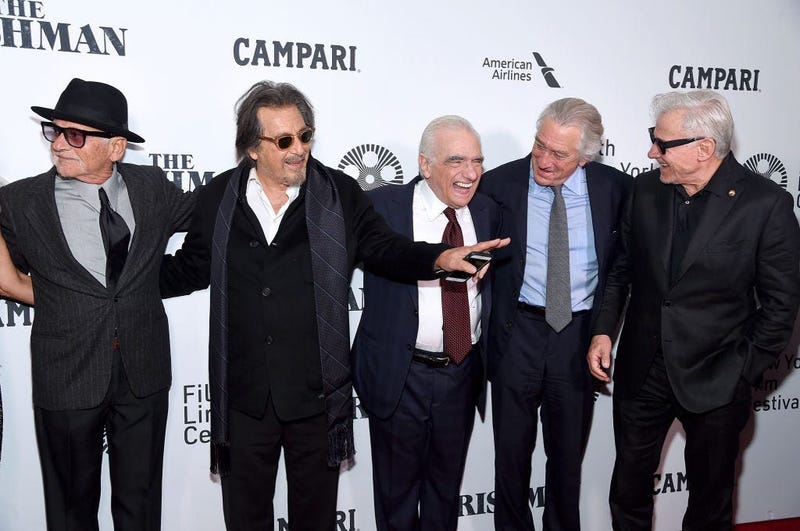(670 The Score) A decade of rumors about a film centered around a mob hitman have finally come to fruition, as Martin Scorsese directs The Irishman, his film adaptation of Charles Brandt's I Heard You Paint Houses.
That 2004 memoir centers around an Irish-American World War II hero-turned-mob enforcer, Frank Sheeran, who ultimately confesses in detail the murder of Teamsters Union president Jimmy Hoffa. Fans of the crime drama genre are treated to the cinematic equivalent to the 1971 MLB All-Star Game.
The 42nd Midsummer Classic featured future Hall of Famers Roberto Clemente, Hank Aaron, Harmon Killebrew and Reggie Jackson, among others. I'd imagine watching that game featuring all-time greats all over the field would be a lot like watching Robert De Niro, Al Pacino, Joe Pesci and Harvey Keitel in The Irishman. With the help of anti-aging CGI, can what was once Goodfellas be Goodfellas again?
This version of age-reversing CGI is so new and so jarring at times that it sometimes feels distracting. Scorsese is so confident that you will find the technology believable that the story is told weaving in and out of 1940s Italy and 1970s Detroit. The process is well-executed, and over time moviegoers will likely become more accustomed to these techniques. The technology may be new to the iconic director, but there's still that comedic juxtaposition and amazing use of music that we've come to love over the years.
To his credit, Scorsese doesn't try to "out Scorsese" himself with The Irishman. Signature staples like The Rolling Stones aren't used at all over the course of the nearly three-and-a-half-hour journey. Understated is a motif of The Irishman, as veteran performers pull back and prove that less is indeed more. Pesci plays the most important character in this world. Russel Bufalino was one of the most respected leaders in La Cosa Nostra for more than four decades despite being the boss of a relatively small northeast Pennsylvania family.
Pesci has previously played characters like Tommy DeVito (Goodfellas) and Nicky Santoro (Casino), and here he plays a calm and warm-yet-terrifying Bufalino. Pesci probably has the film's most memorable performance, proving that he's still got "it." Unlike star athletes, actors of the highest caliber never lose their presence on screen. The same can be said for Keitel, who plays Philly boss Angelo Bruno (sometimes referred to as "The Docile Don") with a subdued intensity that could intimidate any man no matter how many houses he has painted.
On the other side of the spectrum, we have Pacino, who plays his loud, gregarious greatest hits no doubt, but his portrayal of Hoffa also jumps off the screen with both dramatic and comedic moments. While watching The Irishman, you're constantly reminded that you're watching one of the best to ever do it in virtually every scene in the movie. However, with the Brandt source material (I Heard You Paint Houses) leading the way, the characters don't ever become larger than the story.
If De Niro, Pacino and Pesci are the blood and guts of the film, the ensemble cast is the backbone. Comprised from an array of established actors like Keitel (Angelo Bruno), Stephen Graham (Anthony Provenzano) and Bobby Cannavale ("Skinny Razor" DiTullio), among others. Ironically, two standout performances from this crime drama came from two standup comedy stars: Ray Romano (Bill Bufalino) and Sebastian Maniscalco ("Crazy Joe: Gallo).
Romano naturally plays the pivotal role of a mob lawyer/Sheeran's gateway to the Bufalino family. Chicago native Maniscalco, known for his animated stage demeanor, gives a chilling performance as the Profaci family enforcer. You really have to immerse yourself in the world Scorsese creates in The Irishman. If you don't, you may miss Jim Norton giving a spot-on portrayal of comedy icon Don Rickles. If you know anything about Norton, you know the role of Rickles is perfectly cast. Anna Paquin is featured prominently throughout the film's final act despite having merely one line or two. Already an Academy Award winner, Paquin carries the burden of being one of Sheeran's emotionally estranged children perfectly.
Perhaps the most surprising performance in The Irishman is from De Niro himself. Although De Niro is obviously the star of the film that the original book is based on, the longtime Scorsese collaborator delivers one of his best roles since Casino. As Sheeran rises quietly through the Teamsters Union and the Bufalino family, De Niro plays the role discretely as Sheeran himself throughout the first two hours of the movie. De Niro unselfishly yields to Pacino's Hoffa, allowing Pacino to deliver one of his best showings in years. As Sheeran's life begins to deteriorate, De Niro's typical bravado begins to wither away as well. We see a truly emotional vulnerability from De Niro's portrayal of the unremorseful former enforcer.
Similar to his previous classics, Goodfellas and Casino, The Irishman shows that whatever monetary highs come with organized crime always come with consequences. Bufalino and Sheeran end up spending their golden years in prison, trading their red wine for mess hall grape juice. Upon release, Sheeran is left to live in an assisted living facility with nothing left but his story. The 3-hour, 29-minute run time feels a bit daunting at times, but keep in mind this is a film adaptation of a book that covers nearly 50 years of Sheeran's front-row seat of American history.
I do recommend reading Houses for even more historical context, particularly details involving organized crimes role in the JFK assassination, but it's not vital to enjoying The Irishman. Time will tell where The Irishman ranks among its crime drama counterparts, but as Netflix changes the way we consume movies, The Irishman is a perfect ending and possibly a beginning.
Note: The Irishman will stream on Netflix beginning on Nov. 29.
Chris Tannehill can be heard on The McNeil & Parkins Show on 670 The Score. Follow him on Twitter @ChrisTannehill and Soundcloud.

